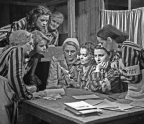FOUR ON LA FLOR
THE LONG VIEW
BY DENNIS LIM
ANY DISCUSSION OF MARIANO LLINÁS’S LA FLOR—A DECADE in the making and 868 minutes in the watching—inevitably begins with its monumentality. It is no longer uncommon, in a digital age that has introduced the concept of “binge viewing,” for any of us to consume vast amounts of narrative media in a single sitting, but duration in cinema remains its own particular kind of collective, reflexive act: among other things, the film becomes about the experience of watching it. Duration has a variety of uses, of course, and Llinás’s conception of the epic shares little with the immersive long-take techniques of a Lav Diaz or a Béla Tarr. Closer in spirit are the films of Jacques Rivette, where the narrative games on screen function as a spell cast on characters and viewers alike. Indeed Rivette’s description of the role of fiction in his own magnum opus, Out 1 (1971)—as a force that “swallows everything up”—applies here.

The realist tendency that dominates the contemporary festival circuit often registers as a fear of stories, an inclination to minimize or suppress narrative machinations so as to avoid indulgence or implausibility. The recently fashionable phenomenon of hybridity, a staple of 21st-century cinema, largely revolves around an attraction to the real, whereby fiction draws on the restless energies of documentary. Relatively few are the filmmakers who have sought to reassert the possibilities and pleasures of drama. They include Miguel Gomes, who reimagined actual events in austerity-era Portugal as modern and period fables in Arabian Nights (2015), and Llinás’s fellow Argentine Matías Piñeiro, who uses fragments of Shakespearean scenarios as the catalytic spark for his own intricate enchantments. Llinás planted his own outsize stake in the soil of fiction with the four-hour-plus Extraordinary Stories (2008), a thicket of stories within stories that follow three main characters over 18 chapters and dozens of subplots involving scores of secondary figures, locations on two continents, multiple cross-pollinated genres, telenovela-ready cliffhangers, and a live lion. Its protagonists, given the task of making narrative sense of situations that lack obvious meaning, are effectively acting out an allegory on the uses and abuses of fiction.
You’re reading a preview, subscribe to read more.
Start your free 30 days





